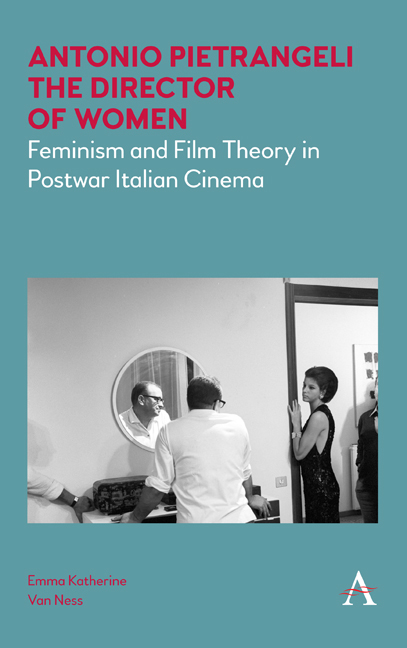Book contents
- Frontmatter
- Dedication
- Contents
- List of Illustrations
- Acknowledgments
- Vita
- Introduction: Antonio Pietrangeli, A Brief History
- Chapter 1 Pietrangelian Film Theory: From Neorealism to Feminism
- Chapter 2 Maid from the Margins: Il sole negli occhi
- Chapter 3 The Coming of Age of a Teenage Bride: Nata di marzo
- Chapter 4 Legally Bound: Political Realism and Prostitution in Adua e le compagne
- Chapter 5 Fantasmi a Roma: Sur-Realism and the Time-Image
- Chapter 6 The Dora Problem: La parmigiana, Piatti, Pietrangeli and Freud
- Chapter 7 Too Much Woman: Marriage, Power, and Excess in La visita
- Chapter 8 Breaking Faith: Il magnifico cornuto, Envy and the Crisis of Vision
- Chapter 9 Io la conoscevo bene … Or did I? Antonio Pietrangeli, the Author and the Actress
- Conclusion: Antonio Pietrangeli, Feminism and Film Theory
- Bibliography
- Index
Chapter 2 - Maid from the Margins: Il sole negli occhi
Published online by Cambridge University Press: 06 May 2020
- Frontmatter
- Dedication
- Contents
- List of Illustrations
- Acknowledgments
- Vita
- Introduction: Antonio Pietrangeli, A Brief History
- Chapter 1 Pietrangelian Film Theory: From Neorealism to Feminism
- Chapter 2 Maid from the Margins: Il sole negli occhi
- Chapter 3 The Coming of Age of a Teenage Bride: Nata di marzo
- Chapter 4 Legally Bound: Political Realism and Prostitution in Adua e le compagne
- Chapter 5 Fantasmi a Roma: Sur-Realism and the Time-Image
- Chapter 6 The Dora Problem: La parmigiana, Piatti, Pietrangeli and Freud
- Chapter 7 Too Much Woman: Marriage, Power, and Excess in La visita
- Chapter 8 Breaking Faith: Il magnifico cornuto, Envy and the Crisis of Vision
- Chapter 9 Io la conoscevo bene … Or did I? Antonio Pietrangeli, the Author and the Actress
- Conclusion: Antonio Pietrangeli, Feminism and Film Theory
- Bibliography
- Index
Summary
More than one time I’ve been asked what is the “thesis” of my film, or what it is that I want to show with Il sole negli occhi. I don't know if it is too ambitious or too modest to say that I wanted to show absolutely nothing, at least in the usual way of conceiving things.
— Antonio Pietrangeli, “Entra la cameriera”He went to her only in the evenings, and knew nothing of how she spent her time during the day, any more than of her past; so little, indeed, that he had not even the tiny, initial clue which, by allowing us to imagine what we do not know, stimulates a desire for knowledge. And so he never asked himself what she might be doing, or what her life had been.”
— Marcel Proust, The Remembrance of Things PastSun in Her Eyes?
Pietrangeli's first film, Il sole negli occhi (1953), was originally entitled Celestina, a name that corresponded to that of the young protagonist, a country girl who comes to Rome to work as a maid. This epochal change in the postwar period between domestic servants who do the work and housewives who consume and command has been discussed by scholars such as Linda McDowell and Raffaela Sarti. As Fullwood explains in her chapter on kitchens and domestic space in Comedy, Italian Style, “The figure of the maid highlights the presence of work in domestic space and troubles any neat, binary associations of work with the public real and home with the private.” The maid or domestic servant, for these theorists, subverts the gendered division of labor and space, exposing the burden of domestic work and revealing the home as an economy in and of itself.
From a marketing standpoint, however, Pietrangeli admits in an interview with Lino Dal Frà, in Cinema Nuovo, that maids don't draw an audience. Allowing the production to change the title “was a grave error,” Pietrangeli states, “because the work was presented and publicized without specifying the tone and the characteristics of the film. The definitive title is simply all wrong […] Celestina seems to me still today the title that most fits the story, simple and modest.”
- Type
- Chapter
- Information
- Antonio Pietrangeli, The Director of WomenFeminism and Film Theory in Postwar Italian Cinema, pp. 29 - 56Publisher: Anthem PressPrint publication year: 2020

